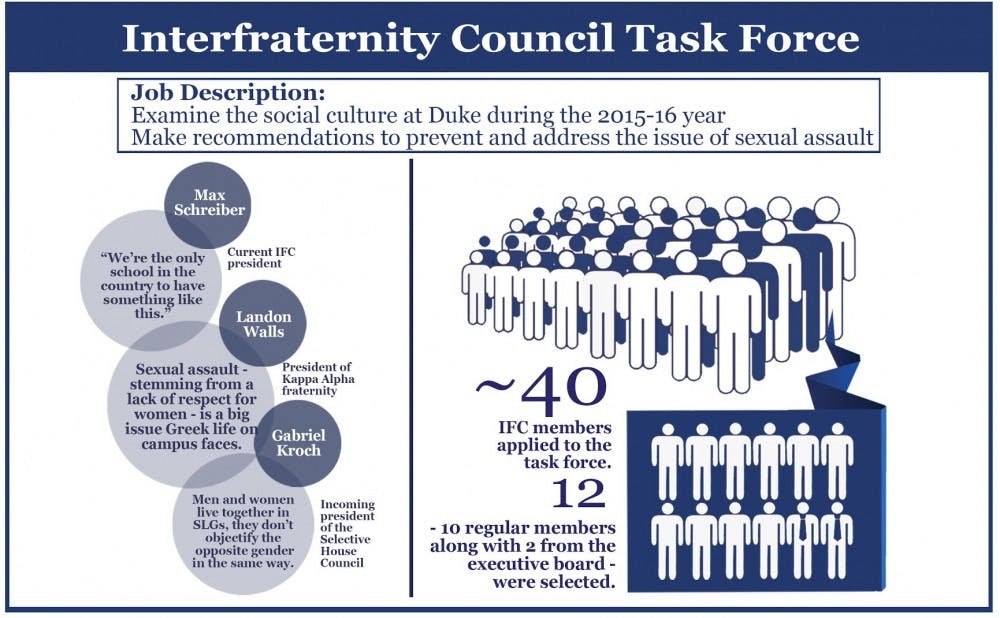The Interfraternity Council has created a student-led task force that will investigate the role Greek life plays in sexual assault on campus.
Composed of 12 IFC members—10 regular members along with two from the executive board—the team will examine the social culture at Duke during the 2015-16 academic year and make recommendations to prevent and address the issue of sexual assault. The project was spearheaded by outgoing IFC president E.J. Baldridge, Trinity '15, who interviewed and selected applicants along with current IFC president and senior Max Schreiber and staff members from the Office of Fraternity and Sorority Life.
“We’re the only school in the country to have something like this,” Schreiber said. “It’s going to be a very Duke-specific exam.”
After participating in several discussions about sexual assault last year, Baldridge said he realized IFC needed to become part of the conversation.
The application process included a statement of interest, along with early morning meetings to see who was truly passionate about the issue, Baldridge said. Nearly 40 students applied to be on the team—a number that greatly surprised him. He noted that IFC tried to attain representation from a wide range of fraternities, and that they were especially interested in underclassmen willing to think outside the box.
The team will meet each week of the next academic year and will have discussions with guests such as Director of Title IX Compliance Howard Kallem and representatives from the Office of Student Conduct, he said. The members will then consider and start crafting solutions to the problem of sexual assault.
"We know that we can't stop [fraternities] from throwing parties, but we can make them safer," Baldridge said. "The question is: how can we combat this without shutting down how [fraternities] operate?"
This is not the first time students have studied sexual assault in Greek life on campus. In 2013, the Greek Culture Initiative—a student-run organization that aimed to effect change in Greek culture—released its report on gender and Greek life, which stated that 38 percent of Greek women reported experiencing unwanted sexual contact. Additionally, Greek women in the study reported feeling less respected by men than women in selective living group and independent housing.
In a 2014 survey by the student organization Duke Inquiries in Social Relations, 46 percent of respondents who reported being sexually assaulted reported that their assailant was Greek-affiliated.
Schreiber noted the importance of acknowledging the issue of sexual assault on college campuses both across the nation and at Duke—especially considering the recent sexual assault claim against Alpha Delta Phi fraternity. The investigation of ADPhi by the Durham Police Department is ongoing, and the fraternity is currently suspended.
Junior Landon Walls, president of Kappa Alpha fraternity, said sexual assault is the biggest issue Greek life on campus is facing, and that the problem may be rooted in a lack of respect for women.
"The IFC is taking steps to make it less of a problem," he said. "I don't know what we need to do, but we need to do something."
Gabriel Kroch, incoming president of the Selective House Council, said sexual assault is less prevalent in selective living groups than Greek organizations, suggesting that because men and women live together in SLGs, they do not objectify the opposite gender in the same way. This leads to less sexual tension, he explained.
In the survey conducted by the GCI, 29 percent of women in SLGs reported experiencing unwanted sexual contact, compared to 38 percent of Greek women.
Most of the problems created by Greek organizations stem from their members' irresponsibility and lack of respect for others, said Sue Wasiolek, assistant vice president for student affairs and dean of students. She noted, however, that Greek organizations could help lower the number of sexual assaults if members hold each other accountable for their behavior.
The formation of the task force may prove particularly important because many students believe the University's social scene revolves around Greek life.
"I think Greek life plays a huge role in social life on campus, partially because there aren’t a lot of other outlets at Duke and in Durham for social life,” Walls said.
Schreiber also said he believes Greek life dominates the social culture at Duke, but noted that more Greek social events have moved off campus in recent years.
A newly-enforced mandate from Housing, Dining and Residential Life requires that 30 percent of residents in SLG and Greek housing be upperclassmen—a policy Wasiolek said was designed to increase senior leadership within housing sections. Some students, however, believe the mandate to be the administration's way of reducing the number of off-campus social events.
Because off-campus apartments and houses owned by seniors are frequent locations for Greek social events, requiring more upperclassmen to live on campus has the potential to keep more of their events on campus and reduce the dominance of Greek life in Duke’s social scene.
Get The Chronicle straight to your inbox
Sign up for our weekly newsletter. Cancel at any time.
“I have a hard time believing the justification given by HDRL about senior leadership,” Walls said. “I think the housing quotas are the first step in reeling the off-campus party scene back in.”
Although Wasiolek acknowledged that studies suggest that the presence of Greek organizations and varsity athletics increase the risk of sexual misconduct on college campuses, she said she does not believe the Greek system is inherently problematic.
“There are many opportunities for creating a sense of community on campus, and the Greek system provides one type of option for this,” she said.

